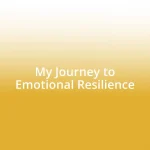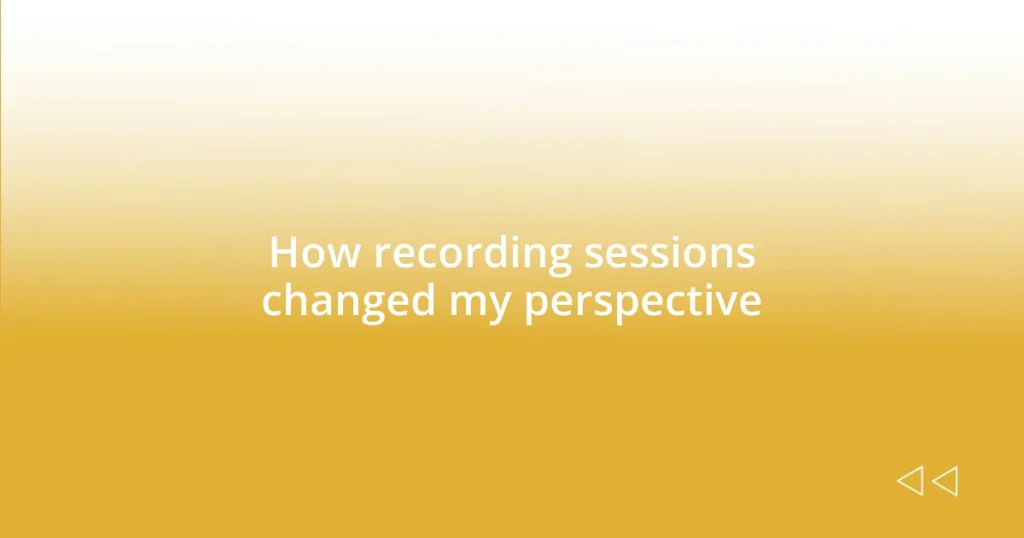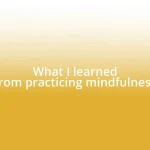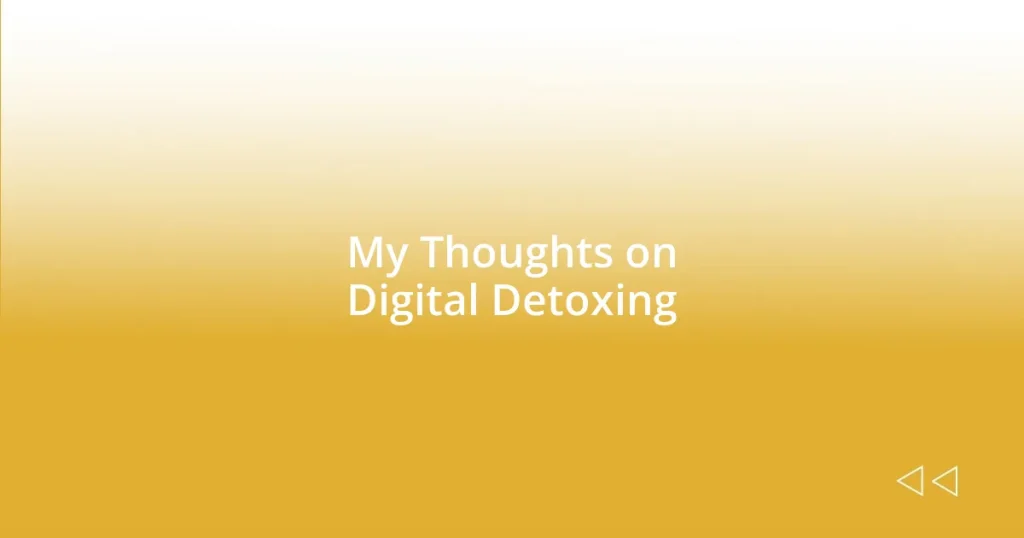Key takeaways:
- Understanding the recording process reveals the importance of small details, like microphone placement, and the collaborative energy among musicians.
- Challenges during sessions emphasize the need for adaptability, flexibility, and maintaining a positive mindset for creative breakthroughs.
- Learning from mistakes fosters curiosity and transforms errors into unique opportunities, enhancing performance and collaboration skills.
- Embracing feedback encourages growth and enriches the creative process, highlighting the value of different perspectives in music-making.

Understanding the recording process
Understanding the recording process can feel like peeling back the layers of a complex onion. Each stage reveals something new, from setting up the microphones to capturing the sounds just right. I still remember my first recording session, standing in the control room, overwhelmed yet exhilarated by the intricate dance between technology and creativity.
As I became more familiar with this process, I realized that every small detail mattered. The placement of a microphone could drastically change how a guitar riff sounded. Have you ever noticed how different a single note can feel when recorded from various angles? For me, it illuminated the profound impact that even slight adjustments can have on the final product.
I often reflect on how the collaborative nature of recording sessions transformed my perspective. It’s not just about the individual performance; it’s about how each musician’s energy intertwines with the others. Have you ever experienced that kind of synergy? It’s an incredible feeling, really, seeing how contributions blend together to create something greater than the sum of its parts. That’s the beauty of the recording process—it’s where magic often happens in layers.

Overcoming challenges during recordings
Recording sessions are often riddled with unexpected challenges that can test your patience and creativity. I recall one session where technical difficulties threw us off balance, impacting our flow. We had spent hours getting the sound just right, only to have the mix suddenly distort. In that moment of frustration, I learned the importance of adaptability. Instead of succumbing to despair, we regrouped, taking a break to refocus and came back with some fresh ideas.
Here are a few ways I’ve found helpful in overcoming challenges during recordings:
- Stay Calm Under Pressure: In high-stress moments, taking a deep breath can help clear your mind.
- Embrace Flexibility: Be open to changing arrangements or song structures when things aren’t working.
- Collaborative Spirit: Lean on fellow musicians and technicians for feedback; sometimes a fresh perspective can solve an issue.
- Have a Backup Plan: Always be prepared with alternative takes or solutions for technical or creative issues.
- Keep a Positive Mindset: I learned that even setbacks can lead to surprising breakthroughs if you maintain a constructive attitude.
Each of these strategies not only helped me navigate through recording hurdles but also deepened my appreciation for the collaborative nature of creating music. Every challenge became an opportunity to learn and connect with my peers in innovative ways.

Learning from mistakes in sessions
Learning from mistakes during recording sessions has been a crucial part of my growth as a musician. I vividly remember a moment when I misplayed a crucial guitar riff during a take, thinking the session was ruined. To my surprise, when we played it back, the mistake added an unexpected texture to the song; that moment taught me that imperfections can sometimes bring unique character to a piece of music. Have you ever accidentally stumbled upon something beautiful from a mistake?
From that point on, I began to view errors as opportunities rather than setbacks. Each time I veered off my intended path, I found myself approaching music with a sense of curiosity. For instance, once I recorded a vocal line that was completely off-key, but instead of feeling defeated, I chose to explore the idea of incorporating it creatively, turning that mistake into a backing vocal harmony. Embracing the “happy accidents” not only encouraged experimentation but also fostered a deep emotional connection to my music.
The process of learning from mistakes in recording sessions also strengthened my collaboration skills. I became more open to feedback, recognizing that constructive criticism could enhance our sound. One remarkable instance involved a drummer who noticed that my timing was off during a take. Rather than feeling embarrassed, I felt grateful for that insight, as it refined my performance and built trust within the group. Engaging with mistakes in this way has transformed how I view teamwork and individual contributions in music-making.
| Type of Mistake | Lessons Learned |
|---|---|
| Technical Errors | Adaptability and problem-solving skills |
| Performance Mistakes | Embracing imperfections leads to unique creativity |
| Timing Issues | The value of constructive criticism and collaboration |

How feedback reshapes my work
Feedback has often acted as a catalyst for my musical evolution. There was a time during a recording session when my guitar solo didn’t resonate with the rest of the band. A fellow musician gently pointed out that my melodic choices felt out of place. Initially, I felt defensive, but after taking a moment to reflect, I realized how crucial that input was. It pushed me to reconsider my approach, ultimately enhancing the overall blend of our track. Have you experienced a moment where someone else’s perspective shifted your understanding of your own work?
Listening to feedback isn’t just about making adjustments; it’s about fostering growth. I remember another instance where someone suggested altering the tempo of a piece we were working on. At first, it seemed like a daunting task. Yet, once I embraced their suggestion, I discovered an entirely new emotional depth to the song. What surprised me was the joy that emerged from this collaboration—transforming a seemingly minor adjustment into something impactful was deeply gratifying. It’s fascinating how openness can lead to breakthroughs, isn’t it?
Over time, I’ve learned to welcome feedback as part of a symbiotic relationship in the recording process. There were sessions where I felt stuck in my creative output, and it was the insightful comments from my peers that inspired fresh ideas. In those moments, I felt the exhilarating pull of collaboration—seeing how different perspectives can complement and elevate each other. It made me appreciate the community we’ve built; each voice enriches our music. How rewarding is it to know that the contributions of others can spark a light in your own creative journey?

Applying insights to future projects
Applying insights from my recording sessions has dramatically influenced how I approach future projects. For instance, after realizing how an offbeat rhythm enhanced a track’s groove, I made it a point to experiment more in my writing sessions. Now, I often ask myself, “What unplanned changes can lead to something special?” This curious mindset opens up new directions I hadn’t considered before.
In one memorable session, a spontaneous lyrical change shifted the entire meaning of a song I was working on. Initially resistant, I learned to embrace these sudden shifts, which made the process feel more organic and alive. This taught me the beauty of being flexible, especially when I now face a blank page; I remind myself that the best ideas can come from places I least expect. Imagine what you could create by simply allowing yourself to wander off the beaten path.
Moreover, I recognize that the insights gained through past recordings don’t just apply to the music itself but also to my entire workflow. I’ve begun integrating structured brainstorming sessions where I encourage my collaborators to voice their raw ideas. Creating an environment that welcomes spontaneous thoughts has significantly enriched our projects. Don’t you think that fostering a space for creativity can lead to breakthroughs we hadn’t anticipated? It’s a lesson I hold close as I continue to evolve in my musical journey.

Continuous growth through recording experiences
Recording experiences have been a crucible for my continuous growth. I recall a session where we were experimenting with layering sounds. I instinctively gravitated towards familiar patterns, but a sudden spark of inspiration led me to stray from my usual style. Embracing that risk not only enriched the track but redefined my creative boundaries. Isn’t it exhilarating to discover a part of yourself you didn’t know existed?
As I reflect on these experiences, I’ve come to appreciate the subtle lessons in every recording session. There was one instance where I recorded an entirely different guitar effect just for fun. At first, I was uncertain about its place in the song, but the unexpected texture it added opened dialogue among my bandmates. They began to play off my experimentation, igniting a burst of creativity that shifted the entire direction of the piece. How often do we underestimate the power of a simple, unplanned detour?
Over time, I’ve seen that capturing these moments serves not just as memories but as learning tools. I’ve filled notebooks with notes from my sessions—little gems of insight that I revisit whenever I face creative roadblocks. Those scribbles remind me of the importance of staying curious and open to experimentation. Isn’t it amazing how even a small recording session can lay the foundation for immense personal and artistic growth?















